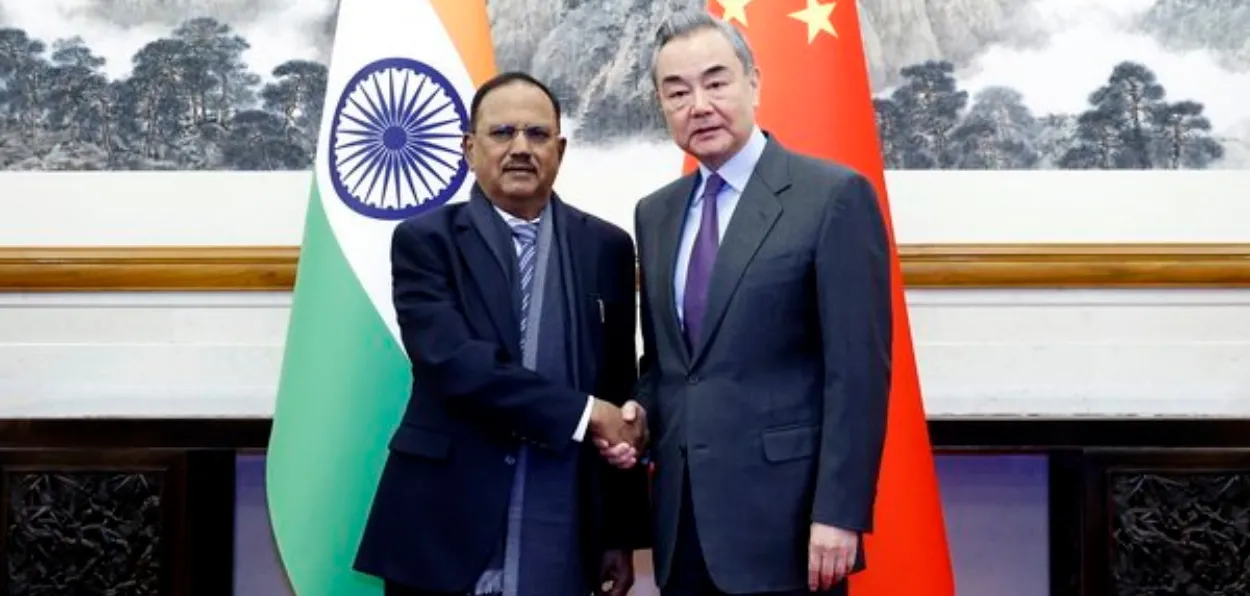
New Delhi
The visiting Chinese Foreign Minister Wang Yi will hold talks with National Security Adviser Ajit Doval today in Delhi. Yi and Doval are the ex officio Special Representatives on the boundary dispute between the two Asian giants.
Wang will hold the 24th round of the Special Representatives talks on boundary questions with Ajit Doval at 11:00 am.
Chinese Foreign Ministry spokesperson Mao said in Beijing that the talks between the Special Representatives of China and India on the Boundary Question have played a positive and constructive role in the two countries' boundary negotiations.
Mao said that during the 23rd round of talks held last year, the two sides reached several important common understandings that are being actively implemented by the two sides.
Chinese experts believe that Wang's visit, with high-level meetings with the Indian side, demonstrates that India attaches great importance to improving ties and shows both sides' sincerity in conducting in-depth and candid talks.
Wang Li is a Member of the Political Bureau of the CPC Central Committee, Minister of Foreign Affairs, and China's Special Representative on the China-India boundary question.
On arrival, Wang Yi held in-depth talks on bilateral relations with External Affairs Minister Dr S Jaishankar.
After the meeting, Jaishkar said, “We had productive conversations on our economic and trade issues, pilgrimages, people-to-people contacts, river data sharing, border trade, connectivity, and bilateral exchanges.”
In a post on X, Jaishankar said, “Our relations are best guided by the three mutuals - mutual respect, mutual sensitivity, and mutual interest. “As we seek to move ahead from a difficult period in our ties, it needs a candid and constructive approach from both sides.”
Welcomed Politburo member and Foreign Minister Wang Yi in Delhi this evening.
— Dr. S. Jaishankar (@DrSJaishankar) August 18, 2025
Highlighted that our relations are best guided by the three mutuals - mutual respect, mutual sensitivity and mutual interest. As we seek to move ahead from a difficult period in our ties, it needs a… pic.twitter.com/xRMYm4Nqpv
The two leaders also exchanged views on global and regional issues. Jaishankar said, he was “Confident that our discussions today would contribute to building a stable, cooperative and forward-looking relationship between India and China.”
Chinese Foreign Ministry spokesperson Mao Ning said on Monday that China hopes to work with India to deliver on the important common understandings between the leaders of the two countries, keep the momentum of high-level exchanges, enhance political mutual trust, strengthen practical cooperation, properly handle differences, and promote the sustained, sound, and steady development of China-India relations.
Global Times, the mouthpiece of the Chinese Communist regime, quoted experts who said that Wang's India itinerary, which includes reported meetings with India's Prime Minister, Minister of External Affairs, and National Security Advisor, demonstrates that India attaches great importance to improving China-India relations and also hopes to enhance mutual trust through frequent interactions.
“On the upcoming talks, we look forward to working with India to first and foremost follow through on the existing common understandings, and on that basis continue the in-depth communication with India to jointly keep the border areas peaceful and tranquil,” said Mao.
Mao added that since the beginning of this year, the two sides have maintained communication through the diplomatic channels and actively advanced the implementation of those outcomes. For the upcoming round of talks, China stands ready to continue the in-depth communication with India on the above-mentioned issues on the basis of the existing common understandings and with a positive and constructive attitude, and together maintain sustained peace and tranquility in the border areas.
As a high-level communication channel, the talks on the boundary question are not only an important platform for border negotiations but also a key mechanism for strategic communication, demonstrating China's willingness to resolve differences through dialogue, Qian Feng, director of the research department at the National Strategy Institute at Tsinghua University, told the Global Times.
Since the resumption of the mechanism last year, China and India have made positive progress on the boundary issue and cross-border cooperation, with both sides expressing the desire to promote the sustained implementation of the relevant consensus, Qian added.
ALSO READ: Dragon and Elephant give fresh chance to their relationship
The talks aim to deepen communication based on existing consensuses, focus on resolving practical issues, and ultimately uphold long-term peace and stability in the border areas, the expert noted.
